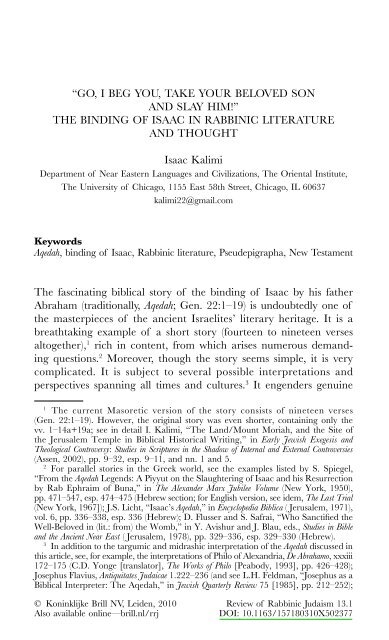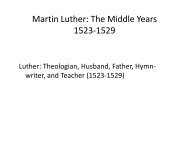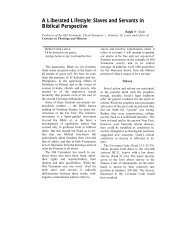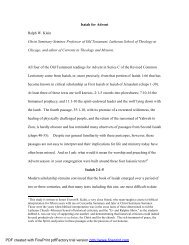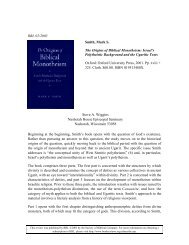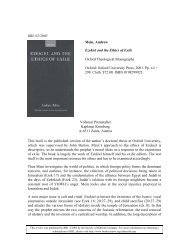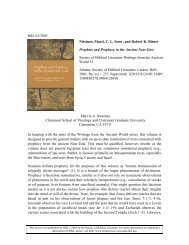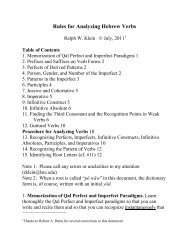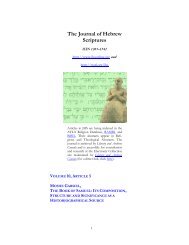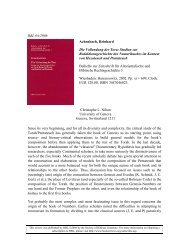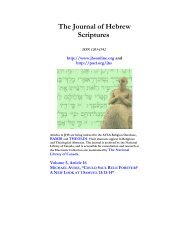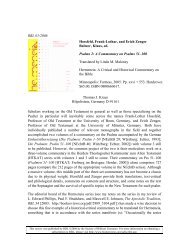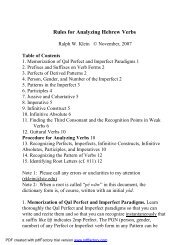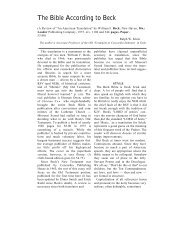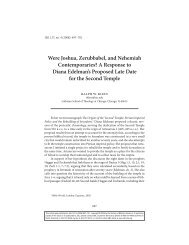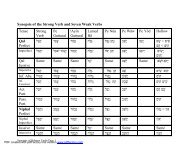“GO, I BEG YOU, TAKE YOUR BELOVED SON AND SLAY HIM ...
“GO, I BEG YOU, TAKE YOUR BELOVED SON AND SLAY HIM ...
“GO, I BEG YOU, TAKE YOUR BELOVED SON AND SLAY HIM ...
Create successful ePaper yourself
Turn your PDF publications into a flip-book with our unique Google optimized e-Paper software.
<strong>“GO</strong>, I <strong>BEG</strong> <strong>YOU</strong>, <strong>TAKE</strong> <strong>YOU</strong>R <strong>BELOVED</strong> <strong>SON</strong><br />
<strong>AND</strong> <strong>SLAY</strong> <strong>HIM</strong>!”<br />
THE BINDING OF ISAAC IN RABBINIC LITERATURE<br />
<strong>AND</strong> THOUGHT<br />
Isaac Kalimi<br />
Department of Near Eastern Languages and Civilizations, The Oriental Institute,<br />
The University of Chicago, 1155 East 58th Street, Chicago, IL 60637<br />
kalimi22@gmail.com<br />
Keywords<br />
Aqedah, binding of Isaac, Rabbinic literature, Pseudepigrapha, New Testament<br />
The fascinating biblical story of the binding of Isaac by his father<br />
Abraham (traditionally, Aqedah; Gen. 22:1–19) is undoubtedly one of<br />
the masterpieces of the ancient Israelites’ literary heritage. It is a<br />
breathtaking example of a short story (fourteen to nineteen verses<br />
altogether), 1 rich in content, from which arises numerous demanding<br />
questions. 2 Moreover, though the story seems simple, it is very<br />
complicated. It is subject to several possible interpretations and<br />
perspectives spanning all times and cultures. 3 It engenders genuine<br />
1 The current Masoretic version of the story consists of nineteen verses<br />
(Gen. 22:1–19). However, the original story was even shorter, containing only the<br />
vv. 1–14a+19a; see in detail I. Kalimi, “The Land/Mount Moriah, and the Site of<br />
the Jerusalem Temple in Biblical Historical Writing,” in Early Jewish Exegesis and<br />
Theological Controversy: Studies in Scriptures in the Shadow of Internal and External Controversies<br />
(Assen, 2002), pp. 9–32, esp. 9–11, and nn. 1 and 5.<br />
2 For parallel stories in the Greek world, see the examples listed by S. Spiegel,<br />
“From the Aqedah Legends: A Piyyut on the Slaughtering of Isaac and his Resurrection<br />
by Rab Ephraim of Buna,” in The Alexander Marx Jubilee Volume (New York, 1950),<br />
pp. 471–547, esp. 474–475 (Hebrew section; for English version, see idem, The Last Trial<br />
(New York, 1967]); J.S. Licht, “Isaac’s Aqedah,” in Encyclopedia Biblica ( Jerusalem, 1971),<br />
vol. 6, pp. 336–338, esp. 336 (Hebrew); D. Flusser and S. Safrai, “Who Sanctified the<br />
Well-Beloved in (lit.: from) the Womb,” in Y. Avishur and J. Blau, eds., Studies in Bible<br />
and the Ancient Near East ( Jerusalem, 1978), pp. 329–336, esp. 329–330 (Hebrew).<br />
3 In addition to the targumic and midrashic interpretation of the Aqedah discussed in<br />
this article, see, for example, the interpretations of Philo of Alexandria, De Abrahamo, xxxiii<br />
172–175 (C.D. Yonge [translator], The Works of Philo [Peabody, 1993], pp. 426–428);<br />
Josephus Flavius, Antiquitates Judaicae 1.222–236 (and see L.H. Feldman, “Josephus as a<br />
Biblical Interpreter: The Aqedah,” in Jewish Quarterly Review 75 [1985], pp. 212–252);<br />
© Koninklijke Brill NV, Leiden, 2010 Review of Rabbinic Judaism 13.1<br />
Also available online—brill.nl/rrj DOI: 10.1163/157180310X502377
2 isaac kalimi<br />
emotions 4 and exposes key theological issues, such as the relationship<br />
between God and mankind and the limits of divine demands and<br />
duties. Additionally, the story deals with the crucial problem of making<br />
choices: between religious belief and fundamental moral obligation<br />
and between faithfulness to God and faithfulness to one’s own<br />
flesh and blood. It deals also with several inter-human relationships,<br />
such as the minimal obligation of a father towards his child and of a<br />
husband towards his wife and his son’s mother. Therefore, there is no<br />
wonder that the story has an important place in all branches of the<br />
Abrahamic religions: Judaism, Samaritanism, Christianity, and Islam,<br />
as well as their various denominations, ancient and modern. In fact,<br />
the story had an enormous impact on these religions’ beliefs, thoughts,<br />
liturgies, literature, and arts. 5 To be sure, the issues raised here troubled<br />
not only the Talmudic rabbis but also many generations of earlier and<br />
later Jewish (and non-Jewish) thinkers: theologians and philosophers,<br />
writers, poets and exegetes, artists and composers. All struggled and<br />
still are struggling to comprehend and reinterpret this astonishing and<br />
horrifying narrative.<br />
The history of the interpretation of the Aqedah is almost as old as<br />
the story itself: it starts in the early stages of the transformation of the<br />
and later on by Rabbi Eleazar of Worms (Germany), Maimonides, Sefer Hazohar,<br />
Don Isaac Abarbanel, Rabbi Levi Isaac of Bardichev, Rabbi Samson Raphael Hirsch,<br />
Rabbi Abraham Isaac Hacohen Cook, and Abraham Joshua Heschel. All are collected<br />
and discussed by A. Evan Chen, The Binding of Isaac: Mystical and Philosophical Interpretation<br />
of the Bible (Tel Aviv, 2006; Hebrew). See also Y. Elbaum, “From Sermon to Story:<br />
The Transformation of the Akedah,” in Prooftexts —A Journal of Jewish Literary History<br />
6 (1986), pp. 97–116; R.M. Jensen, “The Biding or Sacrifice of Isaac: How Jews and<br />
Christians See Differently,” in Bible Review (October 1993), pp. 42–52; M.M. Caspi<br />
and S.B. Cohen, The Binding (Aqedah) and Its Transformations in Judaism and Islam: The<br />
Lambs of God (Lewiston, 1995); L.A. Berman, The Akedah: The Binding of Isaac (Northvale,<br />
1997 [important particularly for its anthology of Yiddish authors’ and various modern<br />
writers’ and thinkers’ views]); E. Noort and E.J.C. Tigchelaar, eds., The Sacrifice<br />
of Isaac: The Aqedah (Genesis 22) and Its Interpretations (Leiden, 2002); and L.H. Kant,<br />
“Restorative Thoughts on an Agonizing Text: Abraham’s Binding of Isaac and the<br />
Horror of Mount Moriah (Genesis 22),” in Lexington Theological Quarterly 38 (2003),<br />
pp. 77–109, 161–194.<br />
4 Compare E. Kessler, Bound by the Bible: Jews, Christians and the Sacrifice of Isaac<br />
(Cambridge, 2004), p. 31. For a detailed review by this author, see I. Kalimi, “Bound<br />
by the Bible?—A Review Essay on Edward Kessler, Bound by the Bible: Jews, Christian and<br />
the Sacrifice of Isaac,” in Review of Biblical Literature 9 (04/2005): http://www.bookreviews<br />
.org/pdf/4501_4561.pdf (for a shorter version of the essay, see Journal of Biblical Literature<br />
124 [2005], pp. 371–376).<br />
5 There are numerous examples in Jewish and Christian art. From ancient and<br />
medieval times, it is worth mentioning the fresco of the Dura Europos synagogue and<br />
the mosaic floors of the synagogues in Beit Alpha and Sepphoris. From Christian art,<br />
noteworthy are the woodcuts in Biblia pauperum-blockbook (ca. 1460), Dresden.
the binding of isaac in rabbinic literature and thought 3<br />
biblical narrative (e.g., Gen. 22:14b; 2 Chr. 3:1). 6 The current study<br />
suggests some perspectives on the place, interpretation, and impact of<br />
the Aqedah in the conglomerate of Rabbinic literature and thought. It<br />
attempts to uncover the rabbis’ position towards God, who demanded<br />
from his loyal servant such an extraordinary act; towards Abraham,<br />
who puts his love and faithfulness in God above those of himself, his<br />
son, wife, family and friends; towards Isaac, who seemingly was ready<br />
to be sacrificed and cooperated with his father; and towards Sarah,<br />
who is not mentioned in the story whatsoever.<br />
1. The Rabbis and the Theological-Ethical Merits of the Aqedah<br />
The biblical narrator does not criticize any of the figures mentioned<br />
in the Aqedah story. However, several theological and ethical questions<br />
emerge from the story, and these are related particularly to God, on<br />
one hand, and to Abraham, on the other. Let us turn our attention to<br />
these questions and examine how the rabbis handle them.<br />
(a) God Tests Abraham<br />
Chapter 22 is the only place in the book of Genesis that God demands<br />
a sacrifice from a human and points out exactly what, how, and where<br />
He wants it, without leaving the one who is to perform the sacrifice<br />
any option. 7 He asks Abraham to sacrifice his long-awaited and beloved<br />
son, Isaac, as a burned offering on one of the mountains of the land of<br />
Moriah (22:2). This request sounds very strange, if not totally absurd:<br />
the mighty King of the universe who has large flocks and herds is<br />
“hungry” for the only little lamb of the aged parents. How could<br />
the merciful God to be so cruel towards His own loyal servant and<br />
unconditionally demand that he murder his beloved son? How could<br />
God request something that completely contradicts his own commandments,<br />
such as “Whoever sheds man’s blood, by man shall his blood<br />
be shed . . .” (Gen. 9:6; which appear in the biblical end-text prior to<br />
6 See Kalimi, “The Land/Mount Moriah,” pp. 9–15. For a list of additional<br />
secondary literature and a brief survey, see C. Westermann, Genesis 12–36: A Commentary<br />
(Minneapolis, 1981), vol. 2, pp. 351–354.<br />
7 Leviticus and Numbers also point out exactly “what, how, and where” to sacrifice.<br />
However, most of the animal and vegetarian sacrifices are conditional to a person’s<br />
free wish, transgression, and economic situation (e.g., Lev. 1–3).
4 isaac kalimi<br />
the Aqedah) and “You shall not murder” (Exod. 20:13 // Deut. 5:17;<br />
appears as subsequent to the Aqedah)? 8<br />
Furthermore, the Aqedah is the only episode among the biblical stories<br />
of Abraham that opens with the words: “God did test Abraham”<br />
(Gen. 22:1). 9 This opening indeed softens readers’ criticism regarding<br />
God’s cruelty, 10 on the theory that God in fact did not request a<br />
human sacrifice but only a demonstration of Abraham’s unconditional<br />
belief. To be sure, the end of the story proves its original intention<br />
(Gen. 22:11–12). The rabbis followed the biblical text and consider<br />
the whole story a test. God tests Abraham’s absolute faithfulness: is he<br />
ready to give his most precious, beloved son to God?<br />
But why should God test Abraham at all? If He knows the test’s<br />
result, why does He test him? If He does not know the result (an idea<br />
that emerges from the words at the end of the story, “for now I know<br />
that you fear God . . .;” Gen. 22:12b), then the story puts in question<br />
God’s completeness. The harmonistic interpretation of the Rabbinic<br />
sources (e.g., Genesis Rabbah 56:7; ca. 400–500 C.E.) 11 and their<br />
medieval followers 12 does not make the problem disappear. The view<br />
that God himself knew the result but that He just wanted to show<br />
Abraham’s righteousness to people is unacceptable because no one was<br />
on the mount at the time of the Aqedah (unless we say that God knew<br />
that this story would be told to following generations). Moreover, as<br />
the Jewish German philosopher Hans Blumenberg states: “What the<br />
philosophers cannot accept from God is the obedience He demands<br />
from Abraham—obedience that stands against all the nature—to offer<br />
8 In 1798 Immanuel Kant cited Genesis 22 as an example in which God could not<br />
have really commanded Abraham to slaughter Isaac, because it would have violated<br />
the moral law; see Westermann, Genesis 12–36: A Commentary, vol. 2, p. 354.<br />
9 On the “test/trial” in general, see J. Licht, Testing in the Hebrew Scriptures and in<br />
Post-Biblical Judaism ( Jerusalem, 1973; Hebrew).<br />
10 Similarly, the story in Job 1–2 provides the background that God only tests Job<br />
in order to reveal his loyalty to God in bad as well as in good times.<br />
11 This article quotes from a wide variety of Rabbinic (and other) sources. It is not<br />
always easy to establish their exact dating. I note the relative or accepted dates of the<br />
sources in order to furnish some sense of chronological sequence and development.<br />
Regarding the Midrashim, I usually follow M.D. Herr, “Midrash,” in Encyclopedia<br />
Judaica ( Jerusalem, 1971), cols. 1511–1512. Nonetheless, it is important to keep in<br />
mind that the late editing of a work does not necessarily exclude the possibility of its<br />
containing much earlier material.<br />
12 See, for example, Saadia Gaon and Abraham ibn Ezra in their commentaries on<br />
the site; and Maimonides, Guide of the Perplexed 3:24.
the binding of isaac in rabbinic literature and thought 5<br />
his only son, and just at the last moment to cancel it via a messenger’s<br />
voice from heaven.” 13<br />
The rabbis do not criticize God’s request as was later done by the<br />
medieval Jewish commentator and philosopher Rabbi Joseph ibn<br />
Caspi (Provence, southeastern France; 1280–1332), who asks, “How<br />
could the Lord command such an abomination to be done?” 14 They<br />
hold that God never intended Isaac to be a burned offering. Thus,<br />
the verse “that was no command of mine, nor did it ever enter my<br />
thought” ( Jer. 7:31), which originally was said about a child sacrifice<br />
at Topheth/the Valley of Ben-hinnom, is associated with the Aqedah<br />
(B. Ta. 4a [ca. 500 C.E.]). Moreover, in order to soften God’s problematic<br />
test, the rabbis took another direction in Genesis Rabbah 56:8:<br />
"והלעה" אלא "והטחש" ךל יתרמא אל “I did not tell you ‘slaughter him,’<br />
rather ‘take him up’ (upon one of the mountains).” According to this<br />
source, God never intended that Abraham sacrifice his son; Abraham<br />
misunderstood God’s request. 15 The Rabbinic concept that “Abraham’s<br />
ram was created at twilight [at the end of God’s acts of creation]”<br />
(תושמשה ןיב ארבנ םהרבא לש וליא; Tanhuma [Buber] 17:2; ca. late<br />
8th–9th century) 16 promotes this idea: God prepared the ram on the<br />
first Sabbath-eve of the week of Creation, and since then it was waiting<br />
to replace Isaac. 17 This means that God always know that Isaac would<br />
not be sacrificed. In fact, the rabbis regard the Aqedah as the ultimate<br />
and most climatic of God’s ten tests of Abraham. 18 God gave Abraham<br />
13 “Was die Philosophen an diesem Gott nicht ertragen konnten, war der Gehorsam<br />
wider alle Natur, den er von Abraham forderte, als er ihm das Opfer des einzigen<br />
Shones auferlegte und erst im letzten Augenblick durch eine Botenstimme vom Himmel<br />
verhinderte.” See H. Blumenberg, Matthäuspassion (Frankfurt a.M., 1988), p. 111.<br />
14 See Ch. Kasher, “‘How Could the Lord Command Such an Abomination to Be<br />
Done?’—Rabbi Joseph ibn Caspi’s Critics on the Binding of Isaac,” in Et-Hadaat 1<br />
(1997), pp. 38–46 (Hebrew). Kasher also discusses in detail ibn Caspi’s various responses<br />
to this problematic theological issue. Generally, the responses are characterized by a<br />
philosophical and philological effort to soften or even detach the order from God.<br />
According to ibn Caspi, the greatness of Abraham is expressed at the end of the story:<br />
“Lay not your hand upon the lad” (Gen. 22:12), that is, listening to God not to slaughter<br />
Isaac, rather than from the beginning of the story: “Take now your son . . . and offer<br />
him there for a burnt offering” (Gen. 22:2).<br />
15 Rashi (1040–1105) follows this interpretation in his commentary on Gen.<br />
22:12.<br />
16 Compare M. Ab. 5:9 (probably a late addition to M. Abot).<br />
17 Seemingly this tradition is reflected also in the last panel of the mosaic floor of<br />
the synagogue at Beth Alpha (6th century C.E.). The panel presents the ram not as<br />
it described in the biblical text, that is, “a ram caught by its horns in a thicket,” but<br />
rather as one waiting on the side, tied up with a rope to a bush.<br />
18 See M. Ab. 5:3; Perkei deRabbi Eliezer 26. The “ten tests/trials” start with God’s
6 isaac kalimi<br />
freedom of choice, but at the same time he requested him to make “the<br />
right” choice so that everyone acknowledged Abraham’s righteous and<br />
unconditional belief. Thus, B. San. 89b recounts:<br />
R. Simeon ben Abba said, “Na (אנ) can only denote entreaty. This may<br />
be compared to a king of flesh and blood who was confronted by many<br />
wars, which he won by the aid of a great warrior. Subsequently he was<br />
faced with a severe battle. Thereupon he said to him, ‘I pray you, assist<br />
me in battle that people may not say, “There was no reality in the earlier<br />
ones.”’ So also did the Holy One, blessed be He, say to Abraham, ‘I have<br />
tested you with many trials and you were withstanding all. Now, be firm<br />
for my sake in this trial, that men may not say there was no reality in<br />
the earlier ones.’”<br />
Though the rabbis did not criticize God on particular points, apparently<br />
they questioned the Aqedah story as a whole. In other words, even<br />
if the Aqedah is just a “test” of Abraham’s belief, and in fact testing of<br />
a human by God plays an important role in the biblical thought, 19 still<br />
it is too cruel. Is there any justification for such a cruel test? Why did<br />
God suddenly ask Abraham to sacrifice his beloved son?<br />
In order to solve this difficulty, the rabbis searched the immediate<br />
opening phrase of the story: הלאה םירבדה רחא יהיו (Gen. 22:1a). This<br />
phrase is well known particularly from narrative and historical sections<br />
of the Hebrew Bible 20 and generally means “sometime afterward.” 21 It<br />
is a technical, even fossilized, phrase that connects stories or determines<br />
the relative position of a story within a chain of stories. From time to<br />
time, it replaces a precise date found in the earlier text. 22 Nonetheless,<br />
in early Jewish exegesis the phrase was grasped as the definition of a<br />
chronological sequence of a story and related with story/ies recounted<br />
previously. The term םירבד (plural, derived from רבד) is interpreted:<br />
either as a “word” (e.g., Gen. 39:17; 44:4–7; Deut. 1:1; 4:12) or as<br />
command to Abraham “Go to the land that I will show you” (Gen. 12:1) and end with<br />
the same words: “Go to . . . one of the mountains that I will tell you” (Gen. 22:2). For<br />
a detailed discussion of this literary feature in the Abraham cycle, see Kalimi, “The<br />
Land/Mount Moriah,” pp. 9–10. For the characteristic reaction of Abraham in the<br />
“first” and “last” trial, see below, n. 33.<br />
19 See, for example, Exod. 15:25; 16:4; Deut. 8:2, 16; 13:4; Judg. 2:22; Job 1–2.<br />
20 Among its many appearances (e.g., Gen. 15:1; 39:7; 48:1), it is noteworthy to<br />
mention the immediate one in the following paragraph of the chapter under review,<br />
Gen. 22:20a.<br />
21 Compare the translation in the Jewish Study Bible of Gen. 22:1: “Some time<br />
afterward.”<br />
22 Compare, for instance, 2 Chr. 32:1 with 2 Kgs. 18:13//Is. 36:1; and see I. Kalimi,<br />
The Reshaping of Ancient Israelite History in Chronicles (Winona Lake, 2005), pp. 23–24.
the binding of isaac in rabbinic literature and thought 7<br />
an “act, thing” (e.g., Gen. 18:25; 39:19; 2 Chr. 32:1). 23 Accordingly,<br />
הלאה םירבדה רחא יהיו is understood either as” After these words” or<br />
“After these acts/things”:<br />
(1) םירבד = “words:” B. San. 89b reads:<br />
“And it came to pass after these words, that God did test Abraham”<br />
(Gen. 22:1): What is meant by “after”? R. Yohanan said on the authority<br />
of R. Jose ben Zimra: “After the words of Satan, as it is written, ‘And<br />
the child grew, and was weaned: [and Abraham made a great feast the<br />
same day that Isaac was weaned]’ (Gen. 21:8). Thereupon Satan said to<br />
the Almighty: ‘Sovereign of the universe! To this old man You would<br />
graciously vouchsafe the fruit of the womb at the age of a hundred, yet<br />
of all that banquet which he prepared, he did not have one turtle-dove<br />
or pigeon to sacrifice before you! Has he done aught but in honor of his<br />
son!’ Replied He (= God), ‘Yet were I to say to him, “Sacrifice your son<br />
before me,” he would do so without hesitation.’ Straightway, ‘God did test<br />
Abraham . . . And He said, “Take, I pray (אנ), your son”’ (Gen. 22:1).”<br />
The Midrash connects the story of the Aqedah with the story concerning<br />
the long awaited birth of Isaac (Gen. 21:5; cf. 17:17) and the aged parents’<br />
celebration of the occasion, as it appears in the opening verses of the<br />
previous chapter (Gen. 21:1–8). By doing so, it emphasizes even more<br />
the cruelty of the divine command to slaughter Isaac! Moreover, while<br />
the biblical story reports that the Aqedah stems from the decision of God<br />
to test Abraham, the origin of the midrashic interpretation stems from<br />
Abraham’s unworthy behavior and Satan’s malicious words. The rabbis’<br />
intention is clear: justification of God (theodicy) while blaming Abraham<br />
and Satan. But this approach opens a new theological front: How did<br />
it happen that a wicked power, Satan, has such a decisive influence on<br />
God’s decisions? This problem was ignored altogether by the rabbis.<br />
Nevertheless, it deserves mention that the roots of this theological<br />
tendency are familiar already from the late biblical literature, namely<br />
the books of Chronicles and Job:<br />
(1) The opening story of the book of Job states that Satan was the<br />
one who pushed God to test Job (1:6–2:8 esp. 2:3), 24 though the latter<br />
fears God (1:1, 8–9; likewise Abraham, Gen. 22:12).<br />
23 Compare, for example, Revised Standard Version (RSV) and New Revised Standard Version<br />
(NRSV): “After these things.” Similarly the phase is translated by Jewish Publication<br />
Society: “And it came to pass after these things.” Luther-Bibel translates: „Nach diesen<br />
Geschichten;“ and Die Bibel—Einheitsübersetzung: „Nach diesen Ereignissen.”<br />
24 Although the word “test” does not appear there, the context of the story leaves<br />
no doubt that testing Job is the central theme of the book.
8 isaac kalimi<br />
(2) 1 Chr. 21:1 recounts: “And Satan stood up against Israel and<br />
provoked David to make a census of Israel,” while the earlier parallel text<br />
recounts: “Again the anger of the Lord was kindled against Israel, and<br />
he incited David against them, saying, ‘Go, number Israel and Judah”<br />
(2 Sam. 24:1). 25<br />
The very midrashic feature concerning the Aqedah was already developed<br />
in the pre-Rabbinic era. The book of Jubilees (ca. 161–140 B.C.E.)<br />
states that “Prince Mastema” (a parallel term to Satan, devil, persecuting<br />
demon) 26 pushed God to test Abraham, although he did not doubt<br />
the capacity of Abraham to pass the test as did the Satan in the case<br />
of Job ( Job 1:9–11):<br />
. . . words came in heaven concerning Abraham that he was faithful in<br />
everything which was told him and he loved the Lord and was faithful in<br />
all afflictions. And Prince Mastema came and he said before God, “Behold,<br />
Abraham loves Isaac, his son. And he is more pleased with him than<br />
everything. Tell him to offer him (as) a burnt offering upon the altar. And<br />
you will see whether he will do this thing. And you will know whether he<br />
is faithful in everything in which you test him” ( Jub. 17:15–16). 27<br />
Similarly, Pseudo-Philo, Liber Antiquitatum Biblicarum 32:1–4, 28 asserts<br />
that the one who “pushed” God to command Abraham to sacrifice<br />
his son was not a single heavenly figure, Satan/Prince Mastema, but all<br />
the jealous angels. Thus, also according to this source the initiative was<br />
not of the Lord himself:<br />
25 It seems that by the word Satan the Chronicler did not mean a human Satan as<br />
in 1 Kgs. 11:14, 23 (Hadad the Edomite and Razon the Aramite), but a metaphysical<br />
devil such as in the case of Job ( Job 1:6–12). Indeed, the Greek translators wrote in<br />
Job and Chronicles διάβολος (“devil”) but in 1 Kgs. 11:14 (vv. 23–25 of MT 1 Kgs. 11<br />
do not appear in LXX) the translator(s) simply transliterated the Hebrew word: σατὰν<br />
(“Satan”).<br />
26 In Jub. 49:2, the words “the forces of Mastema” replace תיחשמה “the destroyer”<br />
that appears in Exod. 12:23. The term appears frequently in the Dead Sea Scrolls (e.g.,<br />
1QM 13:11 and 1QS 3:23; 4Q390 1:11). Moreover, “The root of mastema is very similar<br />
to the root of satan both in form (stm vs. stn) and in meaning (‘to be hostile towards’ vs.<br />
‘to accuse, act as adversary’); so S.M. Olyan, A Thousand Thousands Served Him: Exegesis<br />
and the Naming of Angels in Ancient Judaism (Tübingen, 1993), pp. 66–67, esp. 67.<br />
27 The author of Jubilees states that after Abraham successfully passed the test, the<br />
“Prince Mastema was shamed” for his evil initiative ( Jub. 18:11–12).<br />
28 Generally, the book is dated from the time before the destruction of the Second<br />
Temple (70 C.E.), or “around the time of Jesus.” See D.J. Harrington, “Pseudo-Philo: A<br />
New Translation and Introduction,” in J.H. Charlesworth, The Old Testament Pseudepigrapha<br />
(Garden City, 1985), vol. 2, pp. 297–377, esp. 299. Flusser holds that the book was<br />
composed during the first two decades after the destruction of the Temple; see D.<br />
Flusser, “A New Commentary on Pseudo-Philo’s Liber Antiquitatum Biblicarum,” in Tarbiz<br />
67 (1997/98), pp. 135–138, esp. 136 (Hebrew).
the binding of isaac in rabbinic literature and thought 9<br />
And all the angels were jealous of him (= Isaac), God said to him, “Kill<br />
the fruit of your body for me, and offer for me as a sacrifice what has<br />
been given to you by me.” And Abraham did not argue, but set out immediately<br />
(ibid., 1–2). 29<br />
A different legend appears in Targum Pseudo-Jonathan (ca. 7th–8th<br />
centuries C.E.) on Gen. 22:1. The term םירבד was understood also<br />
here as “words.” However, it is not attributed to Satan/Prince Mastema<br />
but to the dispute between Isaac and Ishmael. The Aqedah is related<br />
to a more immediate story that appears in the middle of the previous<br />
chapter and tells about Isaac and Ishmael (Gen. 21:9–21). According<br />
to this legend, God took Isaac at his words:<br />
“And it came to pass after these words” that Isaac and Ishmael were in<br />
dispute. Ishmael said: “It is right for me to be the heir of my father,<br />
since I am his first-born son.” But Isaac said: “It is right for me to be<br />
the heir of my father, since I am the son of Sarah his wife, but you are<br />
the son of Hagar, the handmaid of my mother.” Ishmael answered and<br />
said: “I am more righteous than you, because I was circumcised when<br />
thirteen years old; and if it had been my wish to refuse, I would not<br />
have handed myself over to be circumcised.” Isaac answered and said:<br />
“Am I not now thirty-seven years old? If the Holy One, blessed be He,<br />
demanded all my members I would not hesitate.” Immediately, these<br />
words were heard before the Lord of the universe, and immediately, the<br />
word of the Lord tested Abraham, and said unto him, “Abraham,” and<br />
he said, “Here I am.” 30<br />
(2) םירבד = “acts/things” (of God and Abraham): this understanding<br />
of the biblical term does not appear in the Rabbinic literature but in<br />
the historical writings of Josephus Flavius, Antiquitates Judaicae 1.223–224<br />
(ca. 93–94 C.E.):<br />
This object (= the Aqedah) he indeed attained by the will of God, who,<br />
however, desiring to make trial of his piety towards Himself, appeared<br />
to him (= Abraham) and after enumerating all the benefits that He<br />
(= God) had bestowed upon him (= Abraham)—how He had made him<br />
stronger than his enemies, and how it was benevolence to which he owed<br />
his present felicity and his son Isaac—required him to offer up that son<br />
by his own hand as a sacrifice and victim to Himself.<br />
29 Interestingly, Liber Antiquitatum Biblicarum 18:5; 40:2 states that Abraham fulfilled<br />
this command “gladly.”<br />
30 In his commentary on Gen. 22:1, Rashi suggests both rabbinic exegetical traditions—the<br />
one stated in Sanhedrin 89b as well as that of Targum Pseudo-Jonathan—as<br />
equal alternative interpretations of the Scripture.
10 isaac kalimi<br />
Josephus relates the Aqedah not to any particular story or several<br />
stories 31 that appear in the previous chapter but rather to all the actions<br />
of God and Abraham related in Genesis 12–21. As a historian, he particularly<br />
mentions the political-military advantages that the Lord granted<br />
Abraham (Genesis 14). Whether this tradition stems from a Rabbinic<br />
source, it is hard to say. Interestingly, the medieval commentator, Rabbi<br />
Samuel ben Meir (Rashbam; 1080–1160 C.E.), relates the Aqedah to the<br />
act of the covenant that Abraham made with the Philistines, as recounted<br />
at the very end of the previous chapter (Gen. 21:22–32):<br />
God said to Abraham: you became proud of your son that I gave you<br />
and made a covenant with them (= Philistines), now go and make him a<br />
burned-offer, and let’s see what will happen with the covenant!<br />
(b) Abraham the “Knight of Faith”<br />
The biblical stories of Abraham (Gen. 12:1–25:10) demonstrate that he<br />
did not hesitate to question God when necessary. Thus, Gen. 15:7–8<br />
relates: “And he said to him, I am the Lord who brought you out of Ur<br />
of the Chaldeans, to give you this land to inherit it. And he said, Lord<br />
God, how shall I know that I shall inherit it? ” Likewise, when God declared<br />
that Sarah “shall be the mother of nations; the kings of many people<br />
shall spring from her,” Abraham laughed and said to himself, “Can a<br />
son be born to a man who is a hundred years old? Can Sarah bear a<br />
son when she is ninety? He said to God, ‘If only Ishmael might live<br />
under Your special care!’” (Gen. 17:15–17). Abraham demonstrated<br />
himself also as one who is concerned about innocent human life. He<br />
persistently argued with God concerning the destruction of the wicked<br />
cities, Sodom and Gomorra (Gen. 18:16–33): “Far be it from you to<br />
do such a thing. . . . Far be that from you! Shall not the Judge of all the<br />
earth do justice?” (Gen. 18:25). Such a report is wanting in the biblical<br />
narrative of the Aqedah. Did Abraham question God’s justification for<br />
the Aqedah? Did he challenge God concerning the promises that his<br />
descendants will inherit the land of Canaan (Gen. 12:7; 15:7–21), and<br />
that through Isaac shall Abraham’s descendants be named (Gen. 17:19,<br />
31 See, for instance, A.B. Ehrlich, Mikrâ ki-Pheschutô: Volume I—Divre Tora (Berlin,<br />
1899; reprinted: New York, 1969), pp. 59–60 (Hebrew). Ehrlich holds that “after these<br />
things” refers to the first two stories in the previous chapter (Gen. 21:1–8 and 9–21),<br />
because then Isaac was the only child at home and thus the test to take him away and<br />
sacrifice him was much more difficult.
the binding of isaac in rabbinic literature and thought 11<br />
21; 21:12)? It seems that Abraham does not ask questions as did Job. 32<br />
He even does not approach God as Jeremiah: “Righteous are you, O<br />
Lord, when I complain to you; yet I will plead these points of justice<br />
with you . . .” ( Jer. 12:1). Nevertheless, the story in Genesis 22 does not<br />
reveal if and what were the questions that Abraham may have asked,<br />
nor the answers he received. 33 Moreover, astonishingly Abraham did<br />
not even pray to God to cancel the command to kill his son (though<br />
he had ample time to do so during the same night and later during<br />
the three-day journey to the sacred mount in the land of Moriah).<br />
Abraham definitely could pray to God and contrast the harsh divine<br />
command to sacrifice Isaac with the divine promises that God made to<br />
him, as Jacob did later on. The latter contrasts the potential annihilation<br />
of him and his descendents by Esau in contrast to divine promises to<br />
him (Gen. 32:10–13). Nevertheless, as one who was motivated by his<br />
belief in God, Abraham is ready to perform immediately the immoral<br />
act, to kill his son, without any question. Has he prioritized his religious<br />
belief (םוקמל םדא ןיב) over his moral principles (וריבחל םדא ןיב).<br />
Is Abraham also “testing” God to see how far He would manipulate<br />
His loyal worshiper?<br />
The biblical narrator stresses the general love of Abraham to Isaac<br />
(Gen. 22:2, and see also vss. 7–9 where the word ינב “my son,” “ונב his<br />
son” repeats three times). However, he does not describe the immediate<br />
feelings of Abraham when he was asked to slaughter his son. Lack of<br />
such a description is remarkable when one recalls another, much less<br />
severe situation: when Sarah demanded that Abraham send out Ishmael<br />
and Hagar, “the thing was very displeasing to Abraham on account of<br />
his son” (Gen. 21:9–14, esp. 11). Is such a description in the case of<br />
the Aqedah impossible because of the great range of emotions that are<br />
involved? Or did Abraham completely lessen his human and fatherly<br />
love and mercy (“as a father who pities his children,” Ps. 103:13) in order<br />
to fulfill the divine request? Was there any conflict between Abraham’s<br />
32 It is worth mentioning that at the end of the book of Job, God praises Job (despite,<br />
or even because of, his questions) and rebukes Job’s friends and demands that they<br />
offer sacrifices to atone for their sin, that is, their justification (theodicy) of God and<br />
blaming of Job ( Job 42:7–9).<br />
33 In fact, this situation is similar to what we have in the “first trail” of Abraham<br />
(Gen. 12:1–7). The childless 75 year old Abraham and barren 65 years old Sarah<br />
(Gen. 11:30; 12:4) were asked to go to a foreign land “that I (= God) shall show you”<br />
(12:1). God promises Abraham the land although it is still inhabited by Canaanites<br />
(12:6)! Abraham accepts the promise with thanks, however, without raising any questions<br />
(12:7). See also above n. 18.
12 isaac kalimi<br />
love of God and his love of Isaac, between listening to religious commandment<br />
and keeping the moral value of not killing a human? How<br />
could he justify such a divine’s request?<br />
The biblical narrator also does not relate whether Abraham discussed<br />
the divine command with Isaac, Sarah, or any close member of the<br />
family (e.g., Ishmael and Eliezer). There is not even a clue if Abraham<br />
considered the potentially disastrous impact of his action on close<br />
members of his family. All that the story tells is that suddenly, apparently<br />
at night, Abraham received an order to take his son and sacrifice<br />
him “upon a mountain” that God will show him. He did not refuse to<br />
murder his innocent son; rather, he “woke up early in the morning,”<br />
took Isaac (and two of his servants), and walked three days to fulfill<br />
the divine commandment: to slaughter his son! To cite Pseudo-Philo:<br />
“Abraham did not argue, but set out immediately” (Liber Antiquitatum<br />
Biblicarum 32:1–2).<br />
Since the rabbis did not compose any systematic study on the Aqedah<br />
(and, in fact, except for tractate Abot none of the other tractates systematically<br />
deals with ethical topics), 34 one can mistakenly conclude<br />
that the ethical and humanistic issues were simply beyond the horizons<br />
of the rabbis. However, a careful evaluation of the various scattered<br />
Midrashim reveals that the rabbis were aware of some of the questions.<br />
Thus, Genesis Rabbah 56:10 accounts: 35<br />
R. Bibi Rabbah said in R. Yohanan’s name: He said to Him: “Sovereign<br />
of the universe! When You did order me, ‘Take your son, your only<br />
son’ (Gen. 22:2), I could have answered, ‘Yesterday you promised me:<br />
“Through Isaac shall your descendants be named” (Gen. 21:12), and<br />
now You say: “offer him there for a burnt offering” (Gen. 22:2)?’ But,<br />
God forbid, I did not handle it so, but suppressed my feelings of compassion in<br />
order to do your will. Therefore, may it be your will, O Lord our God,<br />
that when Isaac’s children are in trouble, you will remember that binding<br />
in their favor and be filled with compassion for them.”<br />
Thus, some rabbis were aware that Abraham did not struggle with God;<br />
rather he suppressed his feelings and completely controlled his thoughts.<br />
Similar to Pseudo-Philo, they did not question the instantaneous and<br />
blind obedience of Abraham to God. They say nothing about the fact<br />
that Abraham did not even pray to cancel the harsh divine command.<br />
It seems that the rabbis were not interested in rebuking Abraham but<br />
34 Notably, only one Mishnaic tractate, Abot, is dedicated to the ethical issues.<br />
35 Cf. Y., Ta. 2:4 ([65d]; ca. 400 C.E.).
the binding of isaac in rabbinic literature and thought 13<br />
rather interested in understanding, justifying, and praising him for his<br />
behavior. 36 Does this position put in question the rabbis’ own ethical<br />
values? Several reasons join to explain the rabbis’ position:<br />
(1) The rabbis mainly follow the biblical judgment that Abraham<br />
was tested and found completely faithful (Gen. 22:12). Therefore, he<br />
was praised and rewarded with blessings for his faithfulness, obedience,<br />
and extraordinary act, as is detailed in Gen. 22:16–18: “By myself<br />
have I sworn, said the Lord, for because you have done this thing, and have<br />
not withhold your son, your only son; that in blessing I will bless you, and<br />
in multiplying I will multiply your seed as the stars of the heaven, and<br />
as the sand which is upon the sea shore; and your seed shall possess<br />
the gate of his enemies; And in your seed shall all the nations of the<br />
earth be blessed; because you have obeyed my voice.”<br />
(2) Usually, the rabbis avoided criticizing the patriarchs, the core<br />
founders of the Israelite people. Such a tendency is apparent already<br />
in the book of Chronicles: the Chronicler does not criticize the core<br />
kings of Israel, David and Solomon. He even omits all the negative<br />
stories about them (e.g., 2 Sam. 11–12; 1 Kgs. 11) as well as the slightest<br />
hints regarding anything that potentially could be understood as sin or<br />
inappropriate behavior of them. 37 This feature became a norm of the<br />
classical Rabbinic literature, almost to all Jewish exegesis in pre-modern<br />
times, and the vast majority of the Jewish liturgy. 38 Only from the<br />
seventh century onward, some silky criticisms were expressed in some<br />
piyyutim concerning Abraham’s readiness to offer his son so easily. 39<br />
(3) Apparently, the rabbis held that Abraham fully trusted God<br />
in such a way that he believed that somehow God would save Isaac<br />
and fulfill His promises. Perhaps, their opinion was similar to the<br />
one expressed in another Jewish literary heritage, Hebrews 11:17–19<br />
(ca. 60–69 C.E.):<br />
36 Indeed, Abraham was and is considered so by the Abrahamic religions, Judaism,<br />
Christianity and Islam.<br />
37 See, for instance, Kalimi, The Reshaping of Ancient Israelite History in Chronicles,<br />
pp. 40–42, 94, 140–149. However, Nehemiah refers to Solomon’s transgression (Neh.<br />
13:26).<br />
38 Another example: the Midrash justifies the love of Isaac over Essau (Pesiqta deRav<br />
Kahana 32, 68 (though some other Midrashim criticize him; see Tanhuma [Buber]<br />
Toldoth 8; Midrash Psalms Shocher Tov 7:6; B. Meg. 28a).<br />
39 See S. Elizur, “Did Abraham Our Father Transgress by Binding of Isaac?” in<br />
I. Rosenson and B. Lau, eds., The Binding of Isaac for His Descendents: The Aqedah from an<br />
Israeli Perspective (Tel Aviv, 2003), pp. 215–223 (Hebrew).
14 isaac kalimi<br />
By faith Abraham, when he was tested, offered up Isaac, and he who had<br />
received the promises was ready to offer up his only son, of whom it was<br />
said, “Through Isaac shall your descendants be named” [Gen. 21:12]. He<br />
considered that God was able to raise men even from the dead; hence,<br />
figuratively speaking, he did receive him back.<br />
Indeed, there is no hint in the biblical text concerning whether<br />
Abraham believed in resurrection. Moreover, the source under review<br />
from the Epistle to the Hebrews attempts to identify in Abraham the<br />
idea of resurrection as believed in the case of Jesus. 40 Nonetheless, a<br />
comparable idea of resurrection was already part of Jewish religion at<br />
that time. 41 The rabbis surely knew the statement in Gen. 18:14a: “Is<br />
anything impossible for the Lord?”<br />
(4) Did the rabbis consider the Aqedah an act of Qiddush Hashem (that<br />
is, the sanctification of God’s name, martyrdom)? In other words, by<br />
the act of the Aqedah Abraham was ready to sacrifice his son and consequently<br />
his own life and future in order to fulfill God’s commandment.<br />
This perspective seemingly is reinforced from the legend in Midrash<br />
Lamentations Rabbah 1:50 (ca. 400–500 C.E.). The legend tells about a<br />
Jewish mother, Miriam the daughter of Tanhum (or Nahum) 42 and her<br />
seven sons who were killed by the Caesar, and compares her act with<br />
that of Abraham. After Caesar killed six sons for refusing to bow to a<br />
statue, which is forbidden in the Torah, he wished to kill the seventh<br />
as well. Then “the mother threw herself upon her child and embraced<br />
and kissed him. She said to him, ‘my son, go to the patriarch Abraham<br />
and tell him, “Thus said my mother, Do not preen yourself [on your<br />
righteousness], saying I built an altar and offered up my son, Isaac.<br />
Behold, our mother built seven altars and offered up seven sons in one<br />
day. Yours was only a test, but mine was in earnest.” ’ 43<br />
40 Cf. Rom. 4:17, where Paul states that Abraham believed in God and that<br />
Abraham’s God “gives life to the dead.”<br />
41 See, for instance, Deut. 32:39; 1 Sam. 2:6; 2 Kgs. 4:32–37; Ezek. 37:1–14;<br />
M. San. 10:1. The second of the Eighteen/Nineteen Benedictions ends: “Blessed are<br />
You, God, who raises the dead.”<br />
42 However, probably the name was not “Nahtum,” as appears in the printed texts.<br />
43 There is a parallel story in 2 Macc. 7:1–42 (ca. 143 B.C.E.; for this date, see D.R.<br />
Schwartz, The Second Book of Maccabees: Introduction, Hebrew Translation, and Commentary<br />
[ Jerusalem, 2004], pp. 16–19; Hebrew) and B. Git. 57b. These parallels do not mention<br />
the name of the woman. In the late Jewish tradition she is “Hannah.” For the<br />
origin of the story, its possible historical context in the persecutions of Antiochus IV<br />
(Epiphanes), and in Hadrian’s ban, see Spiegel, “From the Aqedah Legends,”<br />
pp. 476–477. In Antioch, Jews erected a holy place for the mother and her seven sons,<br />
which later was respected also by Christians; see Y. Guttmann, “The Mother and<br />
Her Seven Sons,” in M. Schwabe and Y. Guttmann, eds., Studies in Jewish Hellenism:
the binding of isaac in rabbinic literature and thought 15<br />
It seems that the rabbis of the legend consider the Aqedah the earliest<br />
act of Qiddush Hashem that is documented in the Hebrew Bible. It was<br />
prior to the death of Nadab and Abihu, sons of Ahron (Lev. 10:1–3; 16:1),<br />
whose death in the Tabernacle was considered by the sages as Qiddush<br />
Hashem. 44 The Aqedah is certainly much earlier than the martyrdom stories<br />
told in the book of Daniel. 45 In the latter we read about Hananiah,<br />
Mishael, and Azariah who refused to worship an idol, the golden statute<br />
erected by the king, and preferred to be thrown into the fiery furnace<br />
(Daniel 3). 46 Daniel himself preferred to keep God’s commandment<br />
even because of this he had been thrown to the lions’ den (Daniel 6). 47<br />
Nonetheless, this view of the binding of Isaac is well developed in<br />
medieval times, as we will see below.<br />
All in all, the rabbis consider Abraham’s silence a sign of nobility.<br />
They admire Abraham’s control of his fatherly love and mercy in<br />
order to implement God’s command. They illustrate his portrait as<br />
a paradigm of the highest expression of unconditional adoration of<br />
and obedience to God. Subsequently Abraham became “the father<br />
of believers,” or to cite the term coined later by the Danish philosopher<br />
Søren A. Kierkegaard (1813–1855), “the knight of faith.” 48 This feature<br />
of Abraham became his main characteristic for the next generations<br />
Festschrift Yochanan Levi ( Jerusalem, 1949), pp. 36–37 (Hebrew). For examination of<br />
texts and materials from eastern Mediterranean and northwestern Europe related to<br />
the Maccabean martyrs, see D. Joslyn-Siematokski, Christian Memories of the Maccabean<br />
Martyrs (New York, 2009).<br />
44 See Lev. Rabbah 12:2; B. Zeb. 115b; Midrash Safra, Shemini 36; and see D. Flusser<br />
and S. Safrai, “Nadab and Abihu in Midrash and Philo,” in D. Flusser, Judaism of the<br />
Second Temple Period: Sages and Literature ( Jerusalem, 2002), pp. 278–283 (Hebrew).<br />
45 For Qiddush Hashem in the tannaitic literature generally, see S. Safrai, “Martyrdom<br />
in the Teaching of the Tannaim,” in T.C. de Kruijf and H. van der Sandt, eds.,<br />
Sjaloom: Ter nagedachtenis van Mgr. Dr. A.C. Ramselaar (Arnhem, 1983), pp. 145–164. For<br />
the idea of Qiddush Hashem in Second Temple Judaism and Christianity, see D. Flusser,<br />
“Qiddush Hashem in the Second Temple Period and in Early Christianity,” in Judaism<br />
of the Second Temple Period: Sages and Literature, pp. 238–245 (Hebrew).<br />
46 That the acts of Hananiah, Mishael, and Azariah were considered by the rabbis<br />
acts of Qiddush Hashem; see Sifra, Aharei Mot 13 (86b). However, other rabbinic sources<br />
(e.g., B. Pes. 53b; Y. Ber. chapter 9) reflect that Qiddush Hashem occurs through the<br />
miracle performed on behalf of these three righteous men, rather than through their<br />
offering of their lives (see Safrai, “Martyrdom in the Teaching of the Tannaim,”<br />
pp. 147–149). In any case, Midrash Lam. Rabbah 1:50 is one of the clear cut Rabbinic<br />
texts that talks of martyrdom (though without using the term Qiddush Hashem) in order to<br />
avoid transgressing Torah’s commandment. For an additional examples, see Y. San. 3:2<br />
(1b); B. Ber. 61b; B. San. 74a (see also the discussion of Safrai, ibid., pp. 155–161).<br />
47 The historical context of both stories is also the persecutions of Antiochus IV<br />
(Epiphanes), just before the Maccabean revolt in 166 B.C.E.<br />
48 S.A. Kierkegaard, “The Knight of Faith and the Knight of Infinite Resignation,”<br />
in R. Bretall, ed., A Kierkegaard Anthology (Princeton, 1947), pp. 118–134.
16 isaac kalimi<br />
and the eternal merit for Israel (see Neh. 9:7–8; Ben Sira 44:19–21<br />
[ca. 200–180 B.C.E.]; 1 Macc. 2:51–52 [ca. 130–100 B.C.E.];<br />
Jub. 17:17–18; 19:2–3, 8 [ten tests]; M. Ab. 5:3; Pirqe deRabbi Eliezer 31<br />
[ca. 640–900 C.E.]). 49<br />
(c) The Aqedah and Afterwards<br />
After the Aqedah, there is no more direct divine revelation to Abraham<br />
and, vice versa, no contact of Abraham with God in the rest of Abraham’s<br />
stories in the book of Genesis. Furthermore, while God directly ordered<br />
Abraham to sacrifice his beloved son, later on He did not appear himself,<br />
but sent an angel to prevent the sacrifice (Gen. 22:11). Do these<br />
points indicate a disconnection between the God and Abraham, with<br />
each regretting the Aqedah? Did God regret the cruel test of his loyal<br />
worshiper? Was Abraham upset by God’s merciless test? The rabbis<br />
did not deal with these questions. However, here one recalls the words<br />
of Kierkegaard on what the Aqedah (presumably) did to Abraham:<br />
“From that day Abraham grew old, he could not forget that God had<br />
demanded this of him. Isaac prospered as before, but Abraham’s eyes<br />
were darkened and he knew no more joy.” 50<br />
49 Generally speaking, Christianity grasps the Aqedah as a proto-type and allusion<br />
to Jesus’s crucifixion. Similar to Rabbinic exegesis, it has a positive attitude towards<br />
Abraham (see, for example, D. Lerch, Isaaks Opferung christlich gedeutet. Eine auslegungsgeschichtliche<br />
Untersuchung [Tübingen, 1950]). However, the attitude of the rabbis towards<br />
Abraham and the Aqedah was sharply criticized by Hegesippus (ca. 370–375 C.E.;<br />
probably the name is a corruption of Iosippus, the spelling of Josephus in many<br />
manuscripts. In order to distinguish this Hegesippus from the second century author<br />
(mentioned by Eusebius), some prefer to call him “Pseudo-Hegesippus”). Hegesippus’<br />
Latin composition, which exist in medieval manuscripts under the title of On the Ruin of<br />
the City of Jerusalem History (De excidio urbis Hierosolymitanae Historiae), is mainly a Christian<br />
free translation of Josephus’s Jewish War. Occasionally, the translator integrates remarks<br />
into the work. Thus, in book 5, paragraph 41:2, he writes:<br />
Since of Abraham himself, whom they (= the Jews, I.K.) call father and the<br />
originator of the teaching and the first man of this form of worship, in him<br />
especially they proclaim faith, because he thought his son should not be spared<br />
and brought him to the altars as a victim and did not hesitate to offer him as a<br />
sacrifice. I do not condemn his devotion but I question his piety. . . . Of what kind<br />
is that people, who consider the killing of a human being as a religious act, and<br />
a murder of a family member as a sacrifice offer? What God can exact this or<br />
what sort is the priest, who is able to do this (Qualis ista gens, quae religioni tribuat<br />
hominis necem et sacrificium putet esse paricidium)?<br />
See V. Ussani, ed., Hegesippi qui dicitur historiae libri V (Corpus Scriptorum Ecclesiasticorum<br />
Latinorum 66.1; Vienna and Leipzig: Hölder-Pichler-Tempsky, 1932), p. 387.<br />
50 See S.A. Kierkegaard, Fear and Trembling (Oxford: Oxford University Press, 1939),<br />
p. 7.
the binding of isaac in rabbinic literature and thought 17<br />
2. Did God Test Isaac?<br />
According to the Aqedah story in the Hebrew Bible, Abraham refers to<br />
Isaac as רענ (Gen. 22:5). The same term is also was used by the angel<br />
(Gen. 22:12). The term רענ appears also in Gen. 21:12 and 17–20<br />
as a parallel to the word דלי, “a child, young boy” (Gen. 21:14, 15).<br />
The small boy Samuel, who was just weaned and could take care of<br />
himself in basic ways, he called רענ (1 Sam. 1:23–27; see also 2:11,<br />
21, 26; 3:1, 8). Thus, seemingly, Isaac was a young boy, a lad, when he<br />
marched with his father to land of Moriah. Although it is hard to say<br />
what exactly was Isaac’s age at that time, 51 he was old enough to carry<br />
enough wood for a single burned-offering and to walk some distance<br />
until the mount (Gen. 22:6).<br />
Yet the biblical story states that Abraham was 100 years old and<br />
Sarah was 90 when Isaac was born (Gen. 17:17; 21:5). It reports that<br />
Sarah passed away at the age of 127 (Gen. 23:1). Based on the literary<br />
proximity between the Aqedah (Gen. 22) and Sarah’s death (Gen. 23),<br />
the rabbis conclude that the latter was caused by the former (see below,<br />
§4). Hence, when Abraham took Isaac to the land of Moriah he was<br />
137 years old, while Isaac was 37 years old (Genesis Rabbah 56:8). 52<br />
The introductory words of the Aqedah story state: “God did test<br />
Abraham.” But isn’t the test of Abraham a test of Isaac as well? Did<br />
Isaac know the intention of the journey to the land of Moriah?<br />
Could Abraham cover from him the journey’s aim? The biblical<br />
story represents Isaac as a passive figure in general, and in the Aqedah<br />
story in particular. The only dialogue between the father and son<br />
(Gen. 22:6b-8b) emerges from Isaac’s question: “Behold the fire and the<br />
woods; but where is the lamb for a burnt offering?” Abraham’s reply,<br />
“My son, God will provide himself a lamb for a burnt offering,” does<br />
not reveal his real intention. How did Isaac react when Abraham placed<br />
him on the woods on the altar, with the fire ready at the side, and the<br />
51 Josephus states that at the time of the Aqedah Isaac was 25 years old and Abraham,<br />
125 (Antiquitates Judaicae 1.227). Based on some verses in the book of Jubilees, Rösch<br />
claimed that Isaac was 21 years old and Abraham, 121. Based on the same source,<br />
Nestle came to the conclusion that Isaac was 15 years old and Abraham, 115. He<br />
also claimed that the number “25” of Josephus is mistaken from “15;” see E. Nestle,<br />
“Miscellaneous: 13. Wie alt war Isaak bei der Opferung?” in ZAW 26 (1906), pp. 281–282<br />
(Rösch is cited by Nestle, ibid., p. 292). Nonetheless, all these (and other) speculations<br />
have no basis in the biblical text.<br />
52 Compare Seder Olam Rabbah 1: “When Isaac was bound on the altar, he was<br />
37 years old.” See also Targum Pseudo-Jonathan on Gen. 22:1.
18 isaac kalimi<br />
knife in Abraham’s hand nearing his neck? Did Isaac willingly follow<br />
his father’s instructions, or did he struggle with him? Could the aged<br />
Abraham really impose his will upon, in the rabbis’ count, a 37 years<br />
old young-man?<br />
Some rabbis consider the Aqedah not only a test of Abraham but also<br />
of Isaac, who equally passed this test: 53 he was aware that his father<br />
was leading him to death, yet willingly followed and obeyed him. This<br />
is the intention of the repeated phrase, “and they went both of them<br />
together” (Gen. 22:6b, 8b): 54 that both knew where and for what mission<br />
they were marching (e.g., Lamentations Rabbah, Petichta 24). 55 A clear<br />
expression of this view appears in Genesis Rabbah 56:4:<br />
!ךטחושל אוה ךלוה אלה ,אתבולעד ארב ,ול רמאו קחצי לצא לאמס ול אב<br />
!ןכ תנמ לע היל רמא<br />
(The wicked angel ) Samael approached Isaac and said: “Son of an<br />
unhappy mother! He goes to slay you!” “I accept my fate,” he (= Isaac)<br />
replied.<br />
A more detailed legend appears in Genesis Rabbah 56:8: 56<br />
,ינא רוחב אבא" :ול רמא ,ונב קחצי דקעל םהרבא שקיבש העשב קחצי יבר רמא<br />
אלו הטיחשה לספת אמשו ךרעצאו ןיכס לש הדחפמ יפוג עזעדזי אמש ינששוחו<br />
םדא לוכי םולכ ".קחצי תא דקעיו" דימ 57 "!הפי הפי ינתפכ אלא ,ןברקל ךל הלעת<br />
!ותעדל אלא ?הנש . . . עבשו םישלש ןב תופכל<br />
R. Isaac said: When Abraham wished to sacrifice his son Isaac, he said<br />
to him: “Father, I am a young man and am afraid that my body may<br />
tremble through fear of the knife and I will grieve you, whereby the<br />
slaughter may be rendered unfit and this will not count as a real sacrifice;<br />
53 Therefore, the Aqedah imparts eternal merit to Abraham and Isaac for their descendants.<br />
See, for instance, Y. Ta. 2:1 (8a) and the discussion, below, §5.<br />
54 From a literary viewpoint, the dialogue is structured within a pattern of inclusio:<br />
ודחי םהינש וכליו . . . ודחי םהינש וכליו “and they went both of them together . . . and they<br />
went both of them together” (Gen. 22:6b, 8b). For this literary device and its functions<br />
in the biblical literature, see Kalimi, The Reshaping of Ancient Israelite History in Chronicles,<br />
pp. 295–325.<br />
55 See also Rashi’s commentary on Gen. 22:8, and Yalkut Shimeoni 247:101 (ca.<br />
1200–1300).<br />
56 See also Midrash Hagadol on Gen. 22:3; Targum Pseudo-Jonathan and Targum<br />
Neofiti on the place.<br />
57 On the possibility of the existence of the words in italics (or a variant of them)<br />
in 4Q225 (dated ca. 150 B.C.E.–20 C.E.), see F. Gracia Martinez, “The Sacrifice of<br />
Isaac in 4Q225,” in Noort and Tigchelaar, The Sacrifice of Isaac, pp. 44–57, and their<br />
references to earlier secondary literature. See also L.A. Huizenga, “Obedience unto<br />
Death: The Matthean Gethsemane and Arrest Sequence and the Aqedah,” in Catholic<br />
Biblical Quarterly 71 (2009), pp. 507–526, esp. 509–510.
the binding of isaac in rabbinic literature and thought 19<br />
therefore bind me very firmly.” Forthwith, “he bound Isaac.” Can one bind<br />
a man thirty-seven . . . years old? Only with his permission!<br />
The willingness of Isaac to be sacrificed is stated already by Josephus<br />
(Antiquitates Judaicae 1.232), Pseudo-Philo (Liber Antiquitatum Biblicarum<br />
32:1–3), and 4 Macc. 7:13–14 (between the 1st and early 2nd centuries<br />
C.E.). 58 That is, the root of the notion under review is much earlier<br />
than the editing time of the cited midrashic sources. It appears that the<br />
readiness of Isaac to die gladly for God’s commandment, as reflects from<br />
these sources, has been expressed against the background of the concept<br />
of Qiddush Hashem. This concept was deep-rooted in Second Temple<br />
and Rabbinic Judaism and later in its daughter-religion, Christianity. 59<br />
3. What Really Happened on the Mount?<br />
The Rabbinic sources reflect three approaches concerning what actually<br />
happened upon the mount in the land of Moriah:<br />
(a) Isaac Was not Hurt<br />
According to the biblical story, though Isaac was bound upon the altar,<br />
at the last moment, the Lord’s angel called Abraham from heaven,<br />
saying: “Lay not your hand upon the lad, nor do anything to him”<br />
(Gen. 22:11–12). Thus, Isaac was neither slaughtered nor hurt in any<br />
way, at least not physically. The biblical text is pictorially interpreted<br />
in Genesis Rabbah 56:7:<br />
תרשה יכאלממ תועמד שולש ורשנ—?היה ןכיה ןיכסו—"ךדי חלשת לא רמאיו"<br />
".רענה לא ךדי חלשת לא" ול רמא—!ונקנחא :ול רמא .ןיכסה תחשו<br />
ול שעת לא—המואמ ול שעת לא :ול רמא !םד תפט ונממ איצוא :ול רמא<br />
המומ<br />
And He said: “Lay not your hand upon the lad”—and where was the<br />
knife? Three tears of the angels of the service had dropped upon it and<br />
melted it. He (= Abraham) said to him: I shall strangle him (Isaac). He<br />
said to him: “Lay not your hand upon the lad.” He (= Abraham) said to<br />
58 For a detailed discussion of these sources, see Huizenga, “Obedience unto Death,”<br />
pp. 511–515.<br />
59 See also above, §1, and the references to the studies of Flusser and Safrai cited<br />
there.
20 isaac kalimi<br />
him: let us bring forth from him a drop of blood. He said to him: “Do not<br />
do anything (המואמ) to him; do not make a blemish (המומ) in him.”<br />
A more brutal description of Abraham appears in Midrash Hagadol<br />
(ca. 1300–1400 C.E.) on Gen. 22:12:<br />
והלעאו ותוא קונחא םימלועה ןובר ה"בקה ינפל םהרבא רמא—"ךדי חלשת לא"<br />
רמא ,ךינפל םירביא םירביא ונחתנא "!המואמ ול שעת לא" ול רמא .ךינפל הלועל<br />
"!המואמ ול שעת לא" ול<br />
“Lay not your hand upon the lad”—Abraham said to the Holy One<br />
blessed be He: Lord of Heavens, shall I strangle him and bind him as<br />
a burnt offering in front of you. He said to him: “Do not do anything<br />
to him!”—Shall I cut him into pieces for you? He said to him: “Do not<br />
do anything to him!” 60<br />
Despite the obvious view of Scripture and such an interpretation of it<br />
by rabbis, there were others who pushed in extreme directions: some<br />
say that Isaac was injured and bled, and some talk even about the death<br />
and resurrection of Isaac. These views were expressed in different ways<br />
in the halakhic and aggadic sources.<br />
(b) Isaac Was Injured and Bled<br />
The Tannaitic-halakhic Midrash, Mekhilta deRabbi Ishmael (Parashat<br />
Bo 7 [// Parashat Bo 11], on Exod. 12:13; 2nd century C.E.) speaks of<br />
“the blood of the Aqedah of Isaac:”<br />
ארקיו" רמאנש ,קחצי לש ותדקע םד ינא האור—(גי ,בי 'מש) "םדה תא יתיארו"<br />
א"הד) רמוא אוה ןלהלו (די ,בכ 'רב) " 'וגו הארי הוהי אוהה םוקמה םש םהרבא<br />
לש ותדקע םד ?האר המ ," 'וגו הערה לע םחניו הוהי האר תיחשהכו" :(וט ,אכ<br />
. . . .קחצי<br />
60 See M. Margoliot, ed., Midrash Hagadol on the Five Books of Torah ( Jerusalem, 1947),<br />
p. 355 (Hebrew; translation mine). Interestingly, Genesis Rabbah creates an antithetic<br />
picture of the reaction of the angels whose tears reached down earth (for the cries of<br />
angels, see also Pirqe deRabbi Eliezer 31) and the lack of any fatherly mercy from<br />
Abraham’s side. Contrarily, even when God takes back his command, Abraham insists<br />
on sacrificing or at least hurting his son. Do the rabbis criticize or praise Abraham<br />
for being a tough worshiper? Based on the general trends of the rabbinic sources,<br />
presumably the intention is to praise. In contrast to these sources, Gen. Rabbah 56:8<br />
attempts to soften this impression and tells about the fatherly compassion of Abraham<br />
at that moment: ויניעל תועמד תולפונו תועמד תודירומ ויניעו ןיכסה תא לוטיל די חלוש אוה<br />
אבא לש ותונמחרמ קחצי לש (“He stretched forth his hand to take the knife while the<br />
tears streamed from his eyes, and these tears, prompted by a father’s compassion,<br />
dropped into Isaac’s eyes”). However, “Yet even so, his heart rejoiced to obey the<br />
will of his Creator.”
the binding of isaac in rabbinic literature and thought 21<br />
“And when I see the blood” (Exod. 12:13)—I see the blood of the Aqedah<br />
of Isaac, as it is said: “and Abraham called the name of that place ‘the<br />
Lord will be seen” (Gen. 22:14), and later on it says: “And as he (= the<br />
angel) was about to destroy [ Jerusalem], the Lord saw, and repented of<br />
the evil” (1 Chr. 21:15). What did He see? The blood of Isaac’s Aqedah. . . .<br />
Does “the blood of Isaac’s Aqedah” mean Isaac’s own blood, or does it<br />
refer to “the blood of the ram as if it was the blood of Isaac himself ?”<br />
The Rabbinic sources are divided on this question. On one hand,<br />
Genesis Rabbah 56:9 holds that it was not Isaac’s blood:<br />
R. Judah in the name of R. Benaiah said: He said before Him: Lord of<br />
all the universes, see the blood of this ram as if it were the blood of Isaac<br />
my son, the sacrificial portions of this ram as if they were the sacrificial<br />
portions of my son Isaac (,ינב קחצי לש ומד וליאכ הז ליא לש וימד האור יוה<br />
ירב קחציד וירומיא וליאכ וירומיא)—as we have learned: “See, this is instead<br />
of that, this is an exchange for that; behold, this is a substitute for that.<br />
See, this is (a valid) exchange . . .”<br />
The view that the ram’s blood and flesh are accounted as those of<br />
Isaac is expounded in much detail at Numbers Rabbah 17:2 (ca. 1100–<br />
1200 C.E.):<br />
?"ונב תחת" והמ ?ארקמה רסח—"הלעל והלעיו ליאה תא חקיו"<br />
;ךינפל קורז קחצי םד וליאכ האור אהת םימלועה ןובר םהרבא רמא<br />
;ךינפל יתטשפה קחצי לש ורוע וליאכ האור אהת ךכ רמאו וטישפהו ליאה לטנ<br />
;ךינפל גפתסמ קחצי וליאכ האור אהת ךכ רמא וגיפסהו ולטנ<br />
.חבזמה יבג לע רובצ קחצי לש ורפא וליאכ האור אהת ךכ רמאו ופרש<br />
“Abraham took it and offered it as a burnt-offering instead of his son;” as<br />
it says “And took the ram, and offered him up for a burnt-offering”—does<br />
more need to be said? What then is the purpose of the additional words,<br />
“in the stead of his son”? Abraham said: “Sovereign of the worlds! Regard<br />
the act as though the blood of Isaac were being sprinkled before you!”<br />
He took the ram and flayed it, saying: “O consider the act as though I<br />
had flayed the skin of Isaac before You.” He took the ram and dried its<br />
blood with salt, saying: “O consider the act as though Isaac’s blood were<br />
being dried before You.” He burnt the ram and said: “O consider the act<br />
as though Isaac’s ashes were being heaped up upon the altar.” 61<br />
On the other hand, some rabbis hold that it was the blood of Isaac<br />
himself. Thus the halakhic Midrash Mekhilta deRabbi Shimeon bar<br />
Yohai, Vaerah 6:2: 62<br />
61 Compare Ecc. Rabbah 9:7, 1; Pesiqta Rabbati 40; Tanhuma (Buber), Shallah 14.<br />
62 J.N. Epstein and E.Z. Melammed, eds., Mekhilta D’rabbi Sim’on b. Jochai ( Jerusalem,<br />
n.d.), p. 4.
22 isaac kalimi<br />
םלשל ינא ןמאנ השמל בקה”ה ול רמא—“השמ לא םיהלא רבדיו” רמוא עשוהי יבר<br />
לודגב” ול יתרמאו ,חבזמה יבג לע םד תיעיבר ונממ אציש םהרבא ןב קחצי רכש<br />
ינפל תאבו תלהובמ העובשה ירה וישכעו (אי ,טע ‘הת) “התומת ינב רתוה ךעורז<br />
. . . .םירצממ לארשי ינב תא איצוהל ץרא ךרדכ אלש<br />
R. Joshua said, and God spoke to Moses—“The Holy One, blessed be<br />
He said, to Moses: I am faithful to pay the reward of Isaac, son of Abraham,<br />
from whom issued one quarter (of a measure) of blood on top of the altar, and I<br />
said to him, “By the greatness of your arm preserve the sons appointed<br />
for death” (Ps. 79:11). And now, behold, the oath is insistent. . . .<br />
This is similarly expressed in the aggadic Midrash Tanhuma, Vayerah 23:<br />
He (= Abraham) took up the knife to slaughter him (Isaac), until there<br />
came forth from him one quarter of his blood. And Satan came and knocked<br />
Abraham’s hand, so that the knife fell from his hand. And when he put<br />
his hand to take it up, a heavenly voice went forth and said to him: “Lay<br />
not your hand upon the lad” (Gen. 22:12); and if it had not done so, he<br />
(Isaac) would have been slaughtered already.<br />
This Midrash also interprets the verse: “Lay not your hand upon the lad”<br />
and answers the question: “where was the knife?” However, its reply<br />
leads to a different direction from Genesis Rabbah 56:7, mentioned<br />
above: Abraham felt totally obligated to fulfill God’s request to sacrifice<br />
Isaac. He even caused Isaac to bleed and would have slaughtered<br />
him if Satan (!) and a heavenly voice had not interfered and stopped<br />
him. Thus the rabbis strive to demonstrate the total faithfulness and<br />
uncompromising obedience of Abraham to God.<br />
Several Christian sources speak about the blood of Jesus that “poured<br />
out in his sacrificial death on the cross” (Rom. 3:25; John 19:34;<br />
Heb. 9:14; 10:19). Christ’s blood procures redemption from sin and death<br />
for all mankind (Eph. 1:7; Heb 9:12; 1 Pet 1:19; 1 John 1:7; Rev 1:5),<br />
justifies them before God (Rom. 5:9), sanctifies them, and acquires them<br />
as a holy people fit for the Lord (Heb. 13:12; Acts 20:28; Rev 5:9). It<br />
inaugurates a new covenant between God and man. . . .” (Matt. 26:28<br />
and the parallels; 1 Cor. 11:25; Heb. 10:29; 13:20). 63 Does the blood<br />
of Isaac serve as a Jewish counterpart to the blood of Jesus, a theme<br />
that has an important place in the New Testament and later Christian<br />
63 See C.T.R. Hayward, “The Sacrifice of Isaac and Jewish Polemic against<br />
Christianity,” in Catholic Biblical Quarterly 52 (1990), pp. 292–306 esp. 294.
the binding of isaac in rabbinic literature and thought 23<br />
thought? Davies and Chilton answer this question in the affirmative. 64<br />
However, it is reasonable to accept the thorough study of Hayward<br />
who concludes: “the blood (of the Aqedah) of Isaac originated without<br />
reference to Christianity at all.” 65 In fact, none of the previously<br />
mentioned Rabbinic texts “requires the hypothesis that it originated or<br />
developed with Christianity in mind; on the contrary, they make perfect<br />
sense within a purely Jewish religious and theological context,” 66 as was<br />
demonstrated concerning Tanhuma, Vayerah 23.<br />
(c) Isaac Died and Was Resurrected<br />
The biblical story ends with the words: “So Abraham returned (םהרבא בשיו)<br />
to his servants, and they rose up and went together to Beer-Sheva”<br />
(Gen. 22:19a). The word בשיו, in the singular, applies to the main and<br />
dominant character of the story, Abraham, but it also refers to Isaac,<br />
who accompanied him (Gen. 22:3, 6–8). 67 However, some rabbis still<br />
wonder about the singular form and ask: where is Isaac, did he return<br />
with his father? This question is reinforced by the fact that Isaac was not<br />
mentioned in the following chapter (Genesis 23), about the mourning<br />
for and funeral of his mother. Indeed, Genesis Rabbah 56:11 relates:<br />
וחלש ןנבר םשב היכרב יבר רמא ?אוה ןכיה קחציו—“וירענ לא םהרבא בשיו”<br />
ינפמ הלילב וחלש רמא אנינח יבר ןב יסוי יבר . . . הרות ונממ דומלל םש לצא<br />
.[ערה ןיע =] ןיעה<br />
“So Abraham returned to his servants”—And where was Isaac? R. Berekiah<br />
said in the name of the rabbis: He sent him to Shem to study Torah . . . 68<br />
R. Jose b. R. Hanina said: He sent him [home] at night, for fear of the<br />
[evil] eye. 69<br />
64 See P.R. Davies and B.D. Chilton, “The Aqedah: A Revised Tradition History,”<br />
in Catholic Biblical Quarterly 40 (1978), pp. 514–546, esp. 539.<br />
65 See Hayward, “The Sacrifice of Isaac and Jewish Polemic against Christianity,”<br />
p. 295.<br />
66 Hayward, “The Sacrifice of Isaac and Jewish Polemic against Christianity,” p. 299.<br />
67 Compare, for example, Rabbi Abraham ibn Ezra’s commentary on Gen. 22:19.<br />
There are numerous examples in the Hebrew Bible of this phenomenon, that is, the<br />
use of singular language when the intention is plural (e.g., Deut. 4: 9–10, 19, 21, 25;<br />
22:15a; 2 Sam. 6:2).<br />
68 Compare Targum Pseudo-Jonathan on Gen. 22:19: “The angels took Isaac to the<br />
Beit Midrash of the Great Shem to study Torah, and he was there for three years.”<br />
69 For other solutions suggested by the rabbis, see Spiegel, “From the Aqedah<br />
Legends,” pp. 471–473, and references to additional sources found there.
24 isaac kalimi<br />
There is also a very unusual Rabbinic view that speaks of the death of<br />
Isaac and his resurrection. This view is also expressed in various ways.<br />
Pirqe deRabbi Eliezer 31 and Midrash Hagadol on Gen. 22:12 speak<br />
of Isaac’s death because of a horrible fear:<br />
.האציו ותמשנ החרפ קחצי לש וראוצ לע ברח העיגהש ןויכ רמוא רעילא יבר<br />
לאו רענה לא ךדי חלשת לא" רמאו םיבורכה ינש ןיבמ ולוק ה"בקה עימשהשכו<br />
. . . וילגר לע דמעו וריתהו ,ופוגל ושפנ הרזח "המואמ ול שעת<br />
R. Eliezer says: 70 when the sword touched the neck of Isaac his soul left<br />
him (i.e., he died). As the Holy one, blessed be He, spoke from between<br />
the two Kerubim and said “Lay not your hand upon the lad, and do not<br />
make in him a blemish,” his soul returned back to his body, and he stood<br />
on his feet. . . . 71<br />
Other sources speak of Isaac’s having been physically slaughtered,<br />
burned, and afterwards resurrected from his ashes:<br />
,וניבא בקעי האר :בר רמא ?האר המ ,(וט ,אכ א"הד) "םחניו 'ה האר תיחשהבו"<br />
קחצי לש ורפא :רמא לאומשו ".םאר רשאכ בקעי רמאיו" :(ג ,בל 'רב) ביתכד<br />
.(ח ,בכ 'רב) "השה ול הארי םיהלא" :רמאנש ,האר<br />
“And as he (= the angel) was about to destroy [ Jerusalem], the Lord saw,<br />
and repented” (1 Chr. 21:15). What did He see? Rav said: He saw Jacob,<br />
our ancestor, as it is written, “And Jacob said when he beheld them”<br />
(Gen. 32:3). Samuel said: He saw the ashes of Isaac, as it says, “God will<br />
see for Himself the lamb” (Gen. 22:8) (B. Ber. 62b).<br />
The view of Samuel was also asserted by the Amora Isaac Naphha<br />
at B. Zeb. 62a, 72 followed by Targum Chronicles on 1 Chr. 21:15 (ca.<br />
8th century C.E.):<br />
“God has sent the Angel of Pestilence to Jerusalem in order to destroy it”<br />
(1 Chr. 21:15). However before [it could carry out] the destruction, He<br />
took notice of the ashes of Isaac’s Aqedah that were in the base of the altar.<br />
He then considered his covenant with Abraham that He had made with<br />
him on the Mount of Divine Worship [= Mount Moriah]. . . . 73<br />
70 In Pirqe deRabbi Eliezer 31 this saying is attributed to Rabbi Judah.<br />
71 Margoliot, Midrash Hagadol on the Five Books of Torah, p. 355 (translation mine).<br />
For the various versions of this legend and similar others, as well as its relationship<br />
to the techiyat hametim in the daily prayer, see Spiegel, “From the Aqedah Legends,”<br />
pp. 483–485.<br />
72 See also B. Ta. 16a.<br />
73 The translation here follows R. Le Déaut and S. Robert’s French edition, Targum<br />
des Chroniques (cod. Vat. Urb. Ebr. 1) (Rome, 1971), vol. 1, pp. 86–87. For the Aramaic<br />
text see ibid., vol. 2, p. 128.
the binding of isaac in rabbinic literature and thought 25<br />
Again, do “the ashes of Isaac/Isaac’s Aqedah” in these sources mean the<br />
ashes of Isaac himself, or does it refer to the ashes of the ram of Isaac,<br />
which Abraham sacrificed instead of his son, as is understood by other<br />
Rabbinic sources (e.g., Pirqe deRabbi Eliezer 31)? Midrash Hagadol on<br />
Gen. 22:13 attempts to soften this view and states that the ram was the<br />
head of Abraham’s herd and its name was “Isaac.” So God said: let<br />
“Isaac” (the ram) come instead of “Isaac” (son of Abraham). Thus, “the<br />
ashes of Isaac” are nothing but the ashes of the ram named “Isaac”<br />
and are considered as the person Isaac himself. Another suggestion,<br />
much less legendary, appears in the Jerusalem Talmud (Y. Ta. 2:1 [8a]).<br />
Here the rabbis discuss not the real “ashes of Isaac” but “the ashes<br />
of Isaac as if (וליאכ) they were gathered upon the altar” (לש ורפא ןיאור<br />
חבזמה יבג לע רובצ וליאכ קחצי). The ashes were not there in reality but<br />
it should be imagined.<br />
Though the roots of the legend about Isaac’s death to ashes and<br />
resurrection stem from the Amorites’ Midrashim, it was more developed<br />
and flourished in medieval times. 74 According to those legends, Isaac<br />
did not return from the mount with his father (Gen. 22:19a); rather, he<br />
died, was resurrected from the ashes, and was sent to the Garden of<br />
Eden for three years in order to heal from the wounds of the Aqedah,<br />
until his marriage with Rebecca at the age of 40 (Gen. 25:19). 75 As<br />
demonstrated by Shalom Spiegel, these legends developed particularly<br />
in Rhineland, Germany. Their historical background was the murder<br />
of entire Jewish communities in the crusaders’ pogroms in 1096, which<br />
also led to many Jewish suicides. 76 The legends showed that martyrdom<br />
for the oneness of God occurred already in patriarchal times and that<br />
the resurrection of the dead is from the Torah, exemplified by Isaac’s<br />
resurrection. In other words, Rhineland Jews who preferred death over<br />
denying their religion considered their death as a new Aqedah. They<br />
trusted that there is a hope and life after the horrible massacres. All<br />
who die for being a Jew, for being loyal to God of Israel and his commandments,<br />
would be resurrected even from ashes.<br />
74 On the legend concerning Isaac’s ashes, see Spiegel, “From the Aqedah Legends,”<br />
pp. 483–497.<br />
75 See in detail, Spiegel, “From the Aqedah Legends,” pp. 482–497.<br />
76 See Spiegel, “From the Aqedah Legends,” pp. 477–547; and recently Evan Chen,<br />
The Binding of Isaac, pp. 17–31.
26 isaac kalimi<br />
4. Where Was Sarah?<br />
An essential figure is missing altogether from the biblical story of the<br />
Aqedah: Sarah, Isaac’s mother and Abraham’s wife. Has she nothing to<br />
say after giving birth to Isaac? Did anyone consult her about what is<br />
going to be done to her only son? Indeed, the biblical narrator states<br />
that God spoke to Abraham only (Gen. 22:1–2). But did Abraham tell<br />
Sarah about the divine command? How did he explain Isaac’s and his<br />
own long absence from home? Midrash Tanhuma (Buber; Wayyera 22;<br />
cf. Midrash Hagadol on Gen. 22:3) attempts to fill in this gap:<br />
לכאמ ול הנקתו (הרש) הכלה<br />
הזה רענהו ,יארוב תא יתרכה רבכ םינש שולש ןב יתייהשכ ,תעדוי תא הל רמא<br />
.ךנחנ אלו לודג<br />
.םש ונכנחאו ונחקא ,םירענה תא םיכנחמ םשש ,ונתאמ קוחר דחא םוקמ שיו<br />
!םולשל ךל :ול הרמא<br />
She (Sarah) prepared food for him.<br />
He (Abraham) said to her: I knew the Almighty when I was three years<br />
old; however, this lad (= Isaac) grew up but was not educated.<br />
There is a place, far away from here, where they are educating youths.<br />
I will take him there and educate him.<br />
She replied, go peaceful!<br />
After the Aqedah (Gen. 22), the first time we hear about Sarah is regarding<br />
her death and funeral in the following chapter (Gen. 23). The rabbis<br />
conclude that her death was caused by the Aqedah:<br />
?ירב תייה ןא :ול הרמאו ,ומא לצא קחצי רזח<br />
ןיכסה תא לטנו חבזמ הנבו 'וכו תועבג ינדירוהו םירה ינלעהו יבא ינלטנ הל רמא<br />
!'וכו יטוחשל<br />
!טוחש תייה רבכ ךאלמה ילולא ,אתבולעד ירב לע יוו ,הרמא<br />
.התמש דע תולוק השש החווצ<br />
For Isaac returned to his mother, and she said to him: “Where have<br />
you been, my son?” Said he to her: “My father took me and led me up<br />
mountains and down hills etc., he built an altar and took the knife to<br />
slaughter me etc.”<br />
“Alas,” she said, “for the son of an unhappy mother! Had it not been<br />
for the angel you would by now have been slaughtered!” Thereupon<br />
she uttered six cries . . . and she died (Leviticus Rabbah 20:2; ca. 400–<br />
500 C.E.). 77<br />
77 This view is followed also in medieval times by Rashi, on Gen. 23:2.
the binding of isaac in rabbinic literature and thought 27<br />
A different legend, a bit mystic, appears in Targum Pseudo-Jonathan<br />
on Gen. 22:20. Here the cause of Sarah’s death is not a chat with<br />
Isaac but with Satan. The same one who caused God to test Abraham<br />
caused the death of his wife:<br />
קחצי תי םהרבא תפכד רתב ןמ ןולאה אמגתפ רתב הוהו<br />
קחצי תי סכנ םהרבאד הרש תול ינתו הנטס לזאו<br />
אקינא ןמ תתימו תקנתשאו תנגפו הרש תמקו<br />
After these words and after Abraham bound Isaac, the Satan went to<br />
Sarah and told her that Abraham slaughtered Isaac. She fainted and<br />
became mad and died from her deep grief. 78<br />
The rabbis do not explain how it happened that Sarah died in Hebron<br />
(Gen. 23:2), while Abraham’s Aqedah journey started and ended at Beer-<br />
Sheva (Gen. 21:33; 22:19). Did Sarah leave her husband and move to<br />
Hebron when she heard about Abraham’s Aqedah activity?<br />
5. The Mount of Aqedah and the Eternal Merit of the Fathers<br />
The Rabbinic sources consider the act of Abraham (some of them also<br />
that of Isaac) 79 in the Aqedah as the most important meritorious acts done<br />
by the patriarch(s) for his/their descendants, the Jewish people. The<br />
Aqedah has a central place in Jewish thought, liturgy and religious ritual<br />
as the greatest source of the eternal merit earned by the patriarchs.<br />
The location of the land of Moriah upon one of the mountains of<br />
which Abraham bound his son is unknown. Generations of dispute<br />
between Jews and Samaritans have taken place concerning the chosen<br />
holy site, and particularly concerning the question where the Aqedah<br />
took place. The Samaritans related the Aqedah with Mount Gerizim,<br />
while the rabbis claimed connection between the Temple Mount in<br />
Jerusalem and the site of Aqedah, stating several textual sources. Both<br />
sides interpret some ambiguous biblical texts against the background of<br />
this pragmatic agenda, theological beliefs, and polemical intentions. 80<br />
78 In Zohar, part 1, 11:1, Sarah’s death is explained as a result of her misbehavior<br />
in the celebration that she made in honor of Isaac’s birth: she did not give anything<br />
to poor people, and therefore she was fated to die from grief for Isaac.<br />
79 See, e.g., Y. Ta. 2:1 (8a).<br />
80 On these issues, see the detailed discussion of Kalimi, “The Land/Mount Moriah,”<br />
in Early Jewish Exegesis and Theological Controversy, pp. 9–32; idem, “The Affiliation of<br />
Abraham and the Aqedah with Zion/Gerizim in Jewish and Samaritan Sources,” ibid.,<br />
pp. 33–58.
28 isaac kalimi<br />
Conclusion<br />
The captivating biblical narrative of the Aqedah has proved to be a<br />
crown jewel of the ancient Israelites’ literature. The story of the binding<br />
of Isaac raises several theological and humanistic questions involving<br />
man’s relationship with God, along with man’s relationship with son,<br />
wife, and surroundings. Highlighting genuine emotions and significant<br />
theological and ethical issues, the story holds ground in all Abrahamic<br />
religions. It played an enormous role in shaping these religions’ beliefs,<br />
liturgies, and ritual, while transforming their literature and arts. Many<br />
Talmudic rabbis, along with generations of Jewish and non-Jewish<br />
thinkers trouble to comprehend it.<br />
The various Rabbinic sources provide a wealth of perspectives on<br />
the Aqedah, as they attempt to fill in the gaps of the narrative and suggest<br />
various directions in the interpretation of Scripture. This article<br />
has shown how diverse and complex the Rabbinic responses to the<br />
Aqedah were. Some of the Rabbinic exegetical traditions reflect ideas<br />
first found in Josephus’ writings, perhaps also the Dead Sea Scrolls,<br />
and/or are rooted already in Apocrypha and Pseudepigrapha. Many of<br />
the exegetical traditions continue to influence various Jewish medieval<br />
biblical interpretations that have a great impact on Jews even today.<br />
Generally, the rabbis are much less critical of God and Abraham<br />
than we might be. They see God’s request as a mere test of Abraham’s<br />
unconditional belief. But some rabbis clearly see the issues that many<br />
modern thinkers have raised concerning God’s request. They absolve<br />
God of any blame by holding that Abraham misunderstood God’s<br />
demand. Others accept God’s choice to test Abraham, justifying God’s<br />
action by blaming Satan and Abraham for unworthy behaviors. Still<br />
some rabbis seemingly considered the Aqedah to be Abraham’s act of<br />
Qiddush Hashem. Abraham, in many sources, is viewed as a “knight of<br />
faith,” who is truly motivated by his religious belief over moral command.<br />
He immediately commits the immoral act of killing his son<br />
without questioning God or even praying for God to reconsider. The<br />
lack of description and possible suppression of his feelings about<br />
the situation relayed to rabbis that Abraham indeed was quite noble.<br />
The rabbis attempt to understand and justify his immediate acceptance<br />
of the command as praiseworthy. Many rabbis consider the Aqedah a<br />
test of Isaac as well. Isaac knew his father was leading him to death,<br />
yet he obeyed him willingly.
the binding of isaac in rabbinic literature and thought 29<br />
Diverse Rabbinic approaches explain what really happened on the<br />
mount. Some believe that Isaac was not hurt physically, as stated in<br />
Scripture; others state that Isaac was injured and bled. Nevertheless,<br />
the blood of Isaac from Aqedah cannot be viewed as a counterblast to<br />
Jesus’ blood in the New Testament. Still, others hold that Isaac died<br />
and was resurrected, a view based on the statement that Abraham<br />
alone returned from Moriah, and from the lack of mention of Isaac<br />
in the following chapter of Genesis.<br />
Interestingly, throughout the course of the Aqedah, the question<br />
remains as to the whereabouts of Sarah within the text. Since she is not<br />
mentioned again until the following chapter on her death and funeral,<br />
the rabbis relate her death to the Aqedah. The Rabbinic sources dispute<br />
the Samaritans and connect the place of the Aqedah with the site of the<br />
Jerusalem Temple, as had been done already by the Chronicles.<br />
In all, the rabbis consider Abraham’s act of faith to be the most significant<br />
foundation of the merit of the patriarchs from which all future<br />
generations of Jews have benefited. In Torah readings, prayers, and<br />
rituals, the merit of the Aqedah is praised for its national and perpetual<br />
spirit. Thus, the binding of Isaac is of enduring eminence of Israel.


